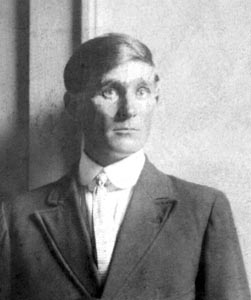

Remember...
Benjamin Harrison Carr
1890-1918
"Wars may be fought with weapons, but they are won by men."
General George S. Patton
 | 
Remember...Benjamin Harrison Carr
|
Benjamin Harrison Carr, the son of James S. and Martha [Dobbins] Carr, was born on April 28, 1890, in the community of Sleith in Braxton County, West Virginia. James Carr was a farmer and also raised livestock to support his large family of ten children. As a young man, Benjamin worked on the farm along with the rest of the family. Benjamin later worked as a laborer for the Elk & Little Kanawha Railroad at Tague, West Virginia, which was not far from where he grew up at Sleith.
Benjamin registered for the draft on June 5, 1917, when he was 27 years old. According to his registration card, he was tall and of slender build, with blue eyes and red hair. He was sent to Columbus Barracks in Ohio on August 31, 1917, and assigned to Company A, 60th Infantry Regiment, 5th Infantry Division. Benjamin was then transferred to Camp Greene, North Carolina, for training.
On April 9, 1918, the regiment left for Europe. They landed at Liverpool, England, then traveled by train to Southampton and stopped at Winchester for a few days at rest camps. After crossing the English Channel, Benjamin Carr arrived in Le Havre, France, with the 60th Infantry at the end of April 1918.
The American Expeditionary Forces were vigorously trained for several months in preparation for fighting against the Germans. They received training in methods of open warfare, in the use of rifles and machine guns, and in the use of maps and compasses to navigate through the steep wooded terrain. Since the Germans were using various poison gases as weapons, the troops also received gas training and each soldier was required to wear a gas mask for thirty minutes every day.
The St. Mihiel offensive, one of the most significant battles of World War I, began on September 12, 1918. The primary objective was to clear the way into Verdun and capture the German rail center at Metz. By September 16, 1918, this area of France was liberated from the Germans. From September 17-27, 1918, the 60th Infantry remained in the rear area near Domevre. They were given two days for rest and then resumed training schedules to prepare for another trip to the front.
On the night of September 25, the 69th French Division along with the American 42nd, 78th, 89th, and 90th Divisions made a series of raids upon the German lines to divert their attention from the movements of the American armies in the Meuse-Argonne area.
Companies A and C of the 60th Infantry were attached to the 69th French Division for the raids. The troops were subjected to heavy machine gun fire, along with high explosives and gas shelling. Four officers were wounded. Eleven enlisted men were killed, twenty-eight were wounded, nine were gassed, and twelve were listed as missing.
Benjamin Carr was one of the eleven enlisted men killed. He was buried in the St. Mihiel American Cemetery in Thiaucourt, France. At the time of his death, Benjamin was survived by his parents James and Martha Carr; brothers William F., Albert M., Nathan G., Letcher N., and Morgan D.; and sisters Matilda, Virginia, Amanda, and Prudence.

West Virginia Archives and History welcomes any additional information that can be provided about these veterans, including photographs, family names, letters and other relevant personal history.